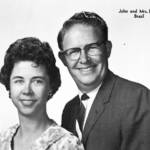
Sharing the Greatest Gift in Honduras
December 31, 2024
John Elliott: Early Missionary to Brazil
January 14, 2025By Dr. John David Smith, President
The next two months of mission:world News will focus on the blessed history of BMA Global. As we focus on this year’s theme, “Send Me,” and build toward World Missions Day on February 23rd, we will rejoice in the blessings of God by hearing selected stories from past BMA Global missionary exploits and experiences.
For seventy-five years, BMA Global Missions has been a testament to God’s faithfulness, weaving a story of sacrifice, transformation, and hope across generations. Reflecting on its rich history, one cannot help but feel a deep sense of nostalgia—images of missionaries embracing foreign cultures, building bridges of trust, and planting seeds of faith come to mind. This legacy is not merely a recollection of past triumphs but a vivid reminder of the incarnational call to missions: to live among, serve, and love people as Christ did. BMA’s past blessings are more than milestones; they are guiding lights for future ministry, inspiring us to step into communities with humility and intentionality, carrying forward the gospel in both word and deed.
The incarnational approach to global missions is a vital model from Christ to us. THE INCARNATION is that divine event when the second person of the Trinity, Jesus Christ, became flesh and dwelt among us. The incarnational model of missions is when we follow the model of Christ to empty ourselves of home, family, and ambitions to live among people to whom God has called us, serve with no inhibitions, and love in an unlimited fashion. Incarnational missions is the expression of the declaration, “Send Me!”
John G. Paton was a Scottish missionary to the New Hebrides Islands (modern-day Vanuatu) in the South Pacific during the 19th century.
Paton and his wife Mary arrived on the island of Tanna in 1858, fully aware of the dangers they faced. The island’s indigenous people were largely unreached with the gospel and practiced cannibalism. Shortly after their arrival, Mary gave birth to a son, but tragedy soon struck. Both Mary and their infant son succumbed to fever, leaving Paton alone in a hostile environment.
Despite his profound grief and the constant threat of attack from the islanders, Paton remained resolute in his mission. He lived in a tree for weeks to escape hostile villagers and endured intense loneliness and danger. Eventually, his efforts bore fruit as he was able to gain the trust of some locals, sharing with them the transformative message of the gospel.
Years later, Paton returned to the islands after remarrying, this time serving on the island of Aniwa. Through his unyielding commitment and love, the entire population of Aniwa converted to Christianity. They even built a church, symbolizing their transformation and new faith.
John G. Paton’s story is a testament to the incredible cost of missionary service and the power of God’s work through those willing to risk everything for the sake of the gospel. His life continues to inspire generations of believers to take up the call to missions with unwavering passion and dedication.
Whether your congregation was recently established in a remote village in Papua New Guinea, began in a European city decades ago, or was planted in a small sawmill town in the southern United States in the 1800s, one truth remains: God used a simple sinner, saved by grace, as His incarnational instrument to share the gospel, disciple believers, and bring them together to form that congregation. Churches do not simply appear from nothing. There has to be a heart transformed by the gospel, a heart filled with the Spirit of God, a heart dominated by the Word of God, and a heart totally given to the call of God’s mission in a specific place. It is that missionary passion and dedication that God has used over and over in just about every corner of the globe to make His name known and fulfill His mission. There will never be a better, more innovative, less sacrificial, or more effective approach to missions than the complete surrender and service embodied in a pure-hearted “Send Me!”

